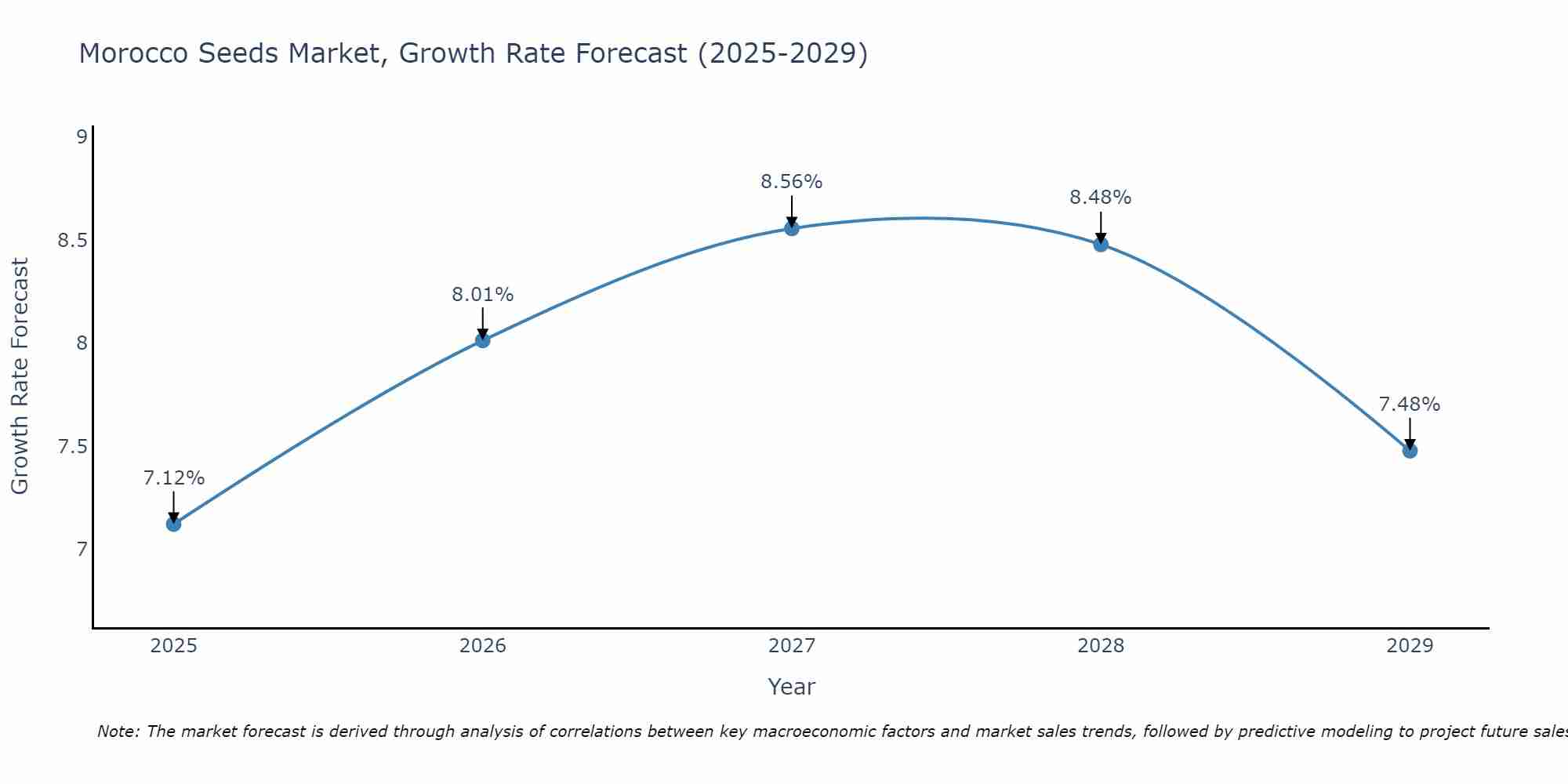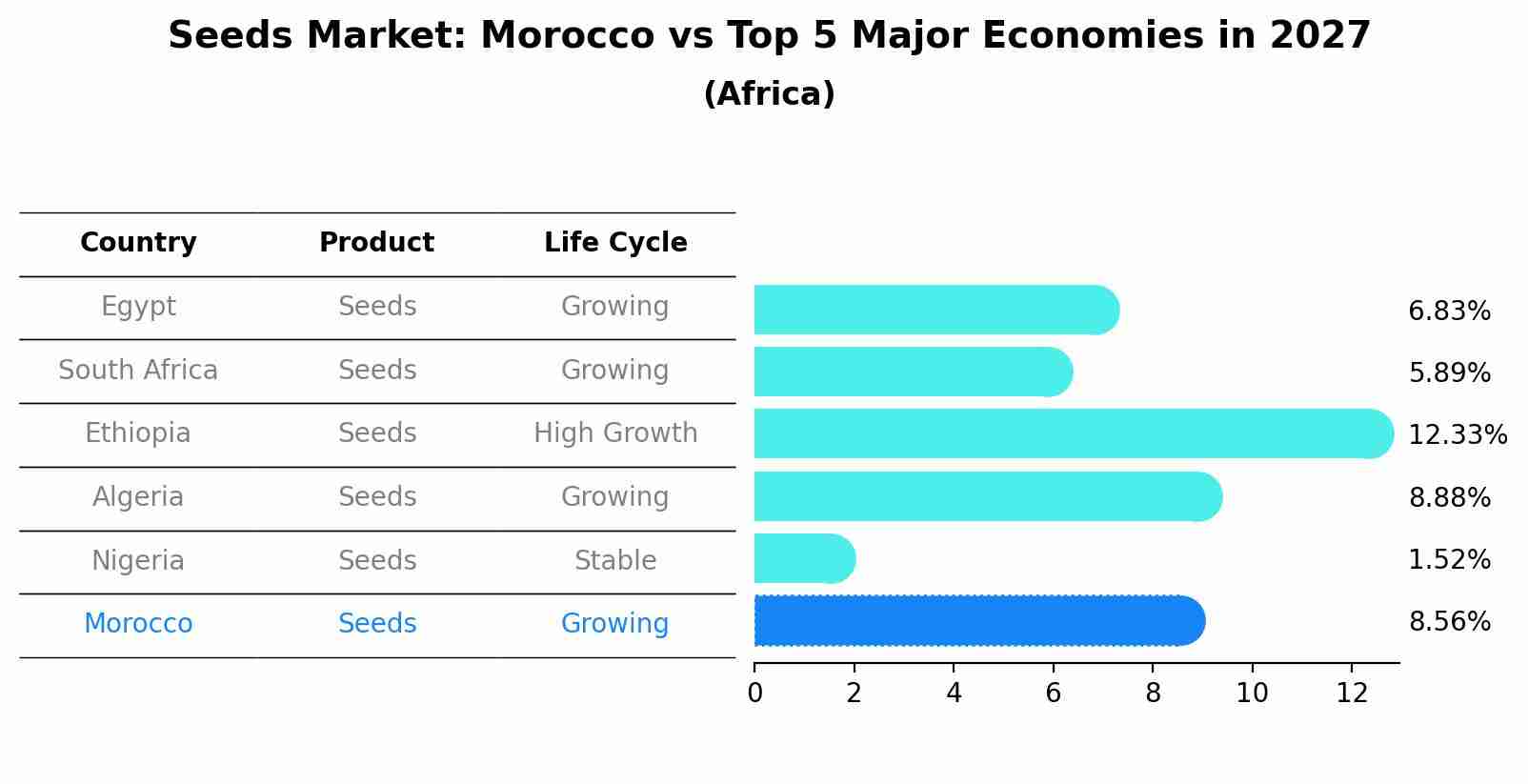Morocco Seeds Market Outlook | Revenue, Value, COVID-19 IMPACT, Companies, Industry, Size, Forecast, Share, Trends, Growth & Analysis
| Product Code: ETC384713 | Publication Date: Aug 2022 | Updated Date: Jul 2025 | Product Type: Market Research Report | |
| Publisher: 6Wresearch | Author: Shubham Padhi | No. of Pages: 75 | No. of Figures: 35 | No. of Tables: 20 |
Morocco Seeds Market Size Growth Rate
The Morocco Seeds Market is projected to witness mixed growth rate patterns during 2025 to 2029. Starting at 7.12% in 2025, the market peaks at 8.56% in 2027, and settles at 7.48% by 2029.

Seeds Market: Morocco vs Top 5 Major Economies in 2027 (Africa)
Morocco's Seeds market is anticipated to experience a growing growth rate of 8.56% by 2027, reflecting trends observed in the largest economy Egypt, followed by South Africa, Ethiopia, Algeria and Nigeria.

Morocco Seeds Market Synopsis
The Morocco seeds market is experiencing steady growth driven by factors such as increasing demand for high-quality seeds for agriculture, rising awareness about the benefits of using certified seeds, and government initiatives to promote sustainable farming practices. The market offers a wide range of seeds including cereals, fruits, vegetables, and oilseeds, catering to the diverse needs of farmers. Key players in the market are focusing on research and development activities to introduce innovative seed varieties that are high-yielding and disease-resistant. Additionally, the adoption of modern farming techniques and technologies is further boosting the demand for quality seeds in Morocco. Overall, the Morocco seeds market is poised for continued expansion as the agriculture sector continues to evolve and modernize.
Morocco Seeds Market Trends
The Morocco Seeds Market is experiencing a growing demand for organic and non-GMO seeds due to increasing consumer awareness about health and sustainability. There is also a rising interest in heirloom and indigenous seed varieties as consumers seek unique and traditional crops. Additionally, technological advancements in seed breeding and genetic engineering are driving innovation in the market, leading to the development of high-yielding and climate-resilient seed varieties. The market is witnessing a shift towards more environmentally friendly practices, with an emphasis on water-efficient and drought-resistant seeds to combat the challenges of climate change. Overall, the Morocco Seeds Market is evolving to meet the changing preferences and needs of consumers while prioritizing sustainability and innovation.
Morocco Seeds Market Challenges
In the Morocco Seeds Market, one of the main challenges faced is the limited access to quality seeds. Small-scale farmers often struggle to obtain certified seeds due to high costs and limited availability, leading to lower crop yields and reduced profitability. Additionally, the lack of awareness and training on modern seed technologies and techniques further hinders the adoption of improved seeds. Another challenge is the presence of counterfeit seeds in the market, which can negatively impact farmers` productivity and crop quality. Addressing these challenges requires collaboration between government agencies, seed producers, and agricultural extension services to ensure better access to quality seeds, provide training and support to farmers, and implement stricter regulations to prevent the circulation of counterfeit seeds in the market.
Morocco Seeds Market Investment Opportunities
The Morocco Seeds Market presents diverse investment opportunities across various sectors such as agriculture, food, and pharmaceuticals. With a growing demand for high-quality seeds driven by an expanding population and increasing focus on sustainable farming practices, investing in seed production companies or research and development in new seed varieties could be lucrative. Additionally, the rising trend of organic farming and the government`s initiatives to promote agricultural innovation further enhance the potential for investment in the seeds market. Collaborating with local farmers to provide them with improved seed varieties and technology solutions can also be a promising avenue for investment in this sector. Overall, the Morocco Seeds Market offers promising opportunities for investors looking to capitalize on the country`s agricultural potential and evolving market trends.
Jordan Agar Market Government Policies
The Morocco Seeds Market is regulated by the government through various policies aimed at ensuring quality, safety, and sustainability. The Ministry of Agriculture has implemented regulations to control the production, distribution, and sale of seeds in the country. These regulations include requirements for seed certification, labeling, and testing to guarantee the quality and authenticity of seeds. Additionally, the government provides support and incentives to promote the use of certified seeds among farmers to improve crop yields and overall agricultural productivity. Furthermore, there are policies in place to encourage research and development in the seed sector to enhance innovation and diversity in seed varieties available to farmers. Overall, the government`s policies in the Morocco Seeds Market aim to foster a competitive and sustainable agricultural industry.
Morocco Seeds Market Future Outlook
The Morocco Seeds Market is poised for steady growth in the future due to several factors such as increasing demand for high-quality seeds in agriculture, government initiatives to promote sustainable farming practices, and rising awareness among farmers about the benefits of using certified seeds. The market is expected to witness a rise in the adoption of genetically modified (GM) seeds to improve crop yields and resilience to climate change. Additionally, advancements in seed technologies, such as precision breeding and biotechnology, are likely to drive innovation in the sector. With a growing emphasis on food security and modernizing the agriculture industry, the Morocco Seeds Market is forecasted to expand, offering opportunities for seed companies to diversify their product offerings and cater to the evolving needs of farmers in the country.
Key Highlights of the Report:
- Morocco Seeds Market Outlook
- Market Size of Morocco Seeds Market, 2021
- Forecast of Morocco Seeds Market, 2031
- Historical Data and Forecast of Morocco Seeds Revenues & Volume for the Period 2018 - 2031
- Morocco Seeds Market Trend Evolution
- Morocco Seeds Market Drivers and Challenges
- Morocco Seeds Price Trends
- Morocco Seeds Porter's Five Forces
- Morocco Seeds Industry Life Cycle
- Historical Data and Forecast of Morocco Seeds Market Revenues & Volume By Type for the Period 2018 - 2031
- Historical Data and Forecast of Morocco Seeds Market Revenues & Volume By Genetically Modified (GM) Seed for the Period 2018 - 2031
- Historical Data and Forecast of Morocco Seeds Market Revenues & Volume By Conventional Seed for the Period 2018 - 2031
- Historical Data and Forecast of Morocco Seeds Market Revenues & Volume By Crop for the Period 2018 - 2031
- Historical Data and Forecast of Morocco Seeds Market Revenues & Volume By Field Crops for the Period 2018 - 2031
- Historical Data and Forecast of Morocco Seeds Market Revenues & Volume By Fruit & Vegetable Crops for the Period 2018 - 2031
- Historical Data and Forecast of Morocco Seeds Market Revenues & Volume By Availability for the Period 2018 - 2031
- Historical Data and Forecast of Morocco Seeds Market Revenues & Volume By Commercial Seeds for the Period 2018 - 2031
- Historical Data and Forecast of Morocco Seeds Market Revenues & Volume By Saved Seeds for the Period 2018 - 2031
- Historical Data and Forecast of Morocco Seeds Market Revenues & Volume By Seed Treatment for the Period 2018 - 2031
- Historical Data and Forecast of Morocco Seeds Market Revenues & Volume By Treated for the Period 2018 - 2031
- Historical Data and Forecast of Morocco Seeds Market Revenues & Volume By Untreated for the Period 2018 - 2031
- Historical Data and Forecast of Morocco Seeds Market Revenues & Volume By Seed Trait for the Period 2018 - 2031
- Historical Data and Forecast of Morocco Seeds Market Revenues & Volume By Herbicide Tolerant for the Period 2018 - 2031
- Historical Data and Forecast of Morocco Seeds Market Revenues & Volume By Insecticide Resistant for the Period 2018 - 2031
- Historical Data and Forecast of Morocco Seeds Market Revenues & Volume By Other Stacked Traits for the Period 2018 - 2031
- Morocco Seeds Import Export Trade Statistics
- Market Opportunity Assessment By Type
- Market Opportunity Assessment By Crop
- Market Opportunity Assessment By Availability
- Market Opportunity Assessment By Seed Treatment
- Market Opportunity Assessment By Seed Trait
- Morocco Seeds Top Companies Market Share
- Morocco Seeds Competitive Benchmarking By Technical and Operational Parameters
- Morocco Seeds Company Profiles
- Morocco Seeds Key Strategic Recommendations
Frequently Asked Questions About the Market Study (FAQs):
- Single User License$ 1,995
- Department License$ 2,400
- Site License$ 3,120
- Global License$ 3,795
Search
Thought Leadership and Analyst Meet
Our Clients
Related Reports
- Canada Oil and Gas Market (2026-2032) | Share, Segmentation, Value, Industry, Trends, Forecast, Analysis, Size & Revenue, Growth, Competitive Landscape, Outlook, Companies
- Germany Breakfast Food Market (2026-2032) | Industry, Share, Growth, Size, Companies, Value, Analysis, Revenue, Trends, Forecast & Outlook
- Australia Briquette Market (2025-2031) | Growth, Size, Revenue, Forecast, Analysis, Trends, Value, Share, Industry & Companies
- Vietnam System Integrator Market (2025-2031) | Size, Companies, Analysis, Industry, Value, Forecast, Growth, Trends, Revenue & Share
- ASEAN and Thailand Brain Health Supplements Market (2025-2031) | Strategy, Consumer Insights, Analysis, Investment Trends, Opportunities, Growth, Size, Share, Industry, Revenue, Segments, Value, Segmentation, Supply, Forecast, Restraints, Outlook, Competition, Drivers, Trends, Demand, Pricing Analysis, Competitive, Strategic Insights, Companies, Challenges
- ASEAN Bearings Market (2025-2031) | Strategy, Consumer Insights, Analysis, Investment Trends, Opportunities, Growth, Size, Share, Industry, Revenue, Segments, Value, Segmentation, Supply, Forecast, Restraints, Outlook, Competition, Drivers, Trends, Demand, Pricing Analysis, Competitive, Strategic Insights, Companies, Challenges
- Europe Flooring Market (2025-2031) | Outlook, Share, Industry, Trends, Forecast, Companies, Revenue, Size, Analysis, Growth & Value
- Saudi Arabia Manlift Market (2025-2031) | Outlook, Size, Growth, Trends, Companies, Industry, Revenue, Value, Share, Forecast & Analysis
- Uganda Excavator, Crane, and Wheel Loaders Market (2025-2031) | Strategy, Consumer Insights, Analysis, Investment Trends, Opportunities, Growth, Size, Share, Industry, Revenue, Segments, Value, Segmentation, Supply, Forecast, Restraints, Outlook, Competition, Drivers, Trends, Demand, Pricing Analysis, Competitive, Strategic Insights, Companies, Challenges
- Rwanda Excavator, Crane, and Wheel Loaders Market (2025-2031) | Strategy, Consumer Insights, Analysis, Investment Trends, Opportunities, Growth, Size, Share, Industry, Revenue, Segments, Value, Segmentation, Supply, Forecast, Restraints, Outlook, Competition, Drivers, Trends, Demand, Pricing Analysis, Competitive, Strategic Insights, Companies, Challenges
Industry Events and Analyst Meet
Whitepaper
- Middle East & Africa Commercial Security Market Click here to view more.
- Middle East & Africa Fire Safety Systems & Equipment Market Click here to view more.
- GCC Drone Market Click here to view more.
- Middle East Lighting Fixture Market Click here to view more.
- GCC Physical & Perimeter Security Market Click here to view more.
6WResearch In News
- Doha a strategic location for EV manufacturing hub: IPA Qatar
- Demand for luxury TVs surging in the GCC, says Samsung
- Empowering Growth: The Thriving Journey of Bangladesh’s Cable Industry
- Demand for luxury TVs surging in the GCC, says Samsung
- Video call with a traditional healer? Once unthinkable, it’s now common in South Africa
- Intelligent Buildings To Smooth GCC’s Path To Net Zero


















